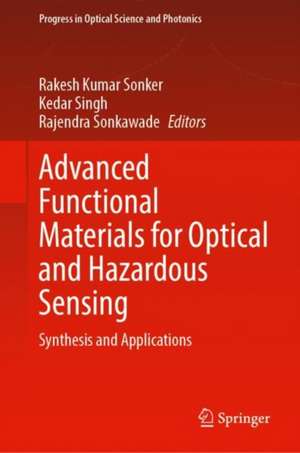Advanced Functional Materials for Optical and Hazardous Sensing: Synthesis and Applications: Progress in Optical Science and Photonics, cartea 27
Editat de Rakesh Kumar Sonker, Kedar Singh, Rajendra Sonkawadeen Limba Engleză Hardback – 3 noi 2023
Din seria Progress in Optical Science and Photonics
- 18%
 Preț: 774.67 lei
Preț: 774.67 lei - 24%
 Preț: 718.48 lei
Preț: 718.48 lei - 18%
 Preț: 947.35 lei
Preț: 947.35 lei - 18%
 Preț: 963.91 lei
Preț: 963.91 lei - 18%
 Preț: 959.98 lei
Preț: 959.98 lei - 15%
 Preț: 666.24 lei
Preț: 666.24 lei - 18%
 Preț: 779.08 lei
Preț: 779.08 lei - 18%
 Preț: 1126.03 lei
Preț: 1126.03 lei - 18%
 Preț: 939.46 lei
Preț: 939.46 lei - 15%
 Preț: 575.59 lei
Preț: 575.59 lei - 15%
 Preț: 575.77 lei
Preț: 575.77 lei - 18%
 Preț: 950.84 lei
Preț: 950.84 lei - 18%
 Preț: 1000.24 lei
Preț: 1000.24 lei - 15%
 Preț: 646.43 lei
Preț: 646.43 lei - 15%
 Preț: 660.83 lei
Preț: 660.83 lei - 18%
 Preț: 890.85 lei
Preț: 890.85 lei - 18%
 Preț: 956.03 lei
Preț: 956.03 lei - 18%
 Preț: 1124.78 lei
Preț: 1124.78 lei - 18%
 Preț: 724.80 lei
Preț: 724.80 lei - 5%
 Preț: 1105.21 lei
Preț: 1105.21 lei - 18%
 Preț: 901.43 lei
Preț: 901.43 lei - 18%
 Preț: 1389.15 lei
Preț: 1389.15 lei - 5%
 Preț: 725.96 lei
Preț: 725.96 lei - 15%
 Preț: 635.01 lei
Preț: 635.01 lei - 15%
 Preț: 589.14 lei
Preț: 589.14 lei - 15%
 Preț: 633.53 lei
Preț: 633.53 lei - 18%
 Preț: 781.94 lei
Preț: 781.94 lei
Preț: 733.96 lei
Preț vechi: 895.07 lei
-18% Nou
Puncte Express: 1101
Preț estimativ în valută:
140.46€ • 146.10$ • 115.96£
140.46€ • 146.10$ • 115.96£
Carte tipărită la comandă
Livrare economică 14-28 aprilie
Preluare comenzi: 021 569.72.76
Specificații
ISBN-13: 9789819960132
ISBN-10: 9819960134
Ilustrații: XIV, 303 p. 89 illus., 80 illus. in color.
Dimensiuni: 155 x 235 mm
Greutate: 0.63 kg
Ediția:1st ed. 2023
Editura: Springer Nature Singapore
Colecția Springer
Seria Progress in Optical Science and Photonics
Locul publicării:Singapore, Singapore
ISBN-10: 9819960134
Ilustrații: XIV, 303 p. 89 illus., 80 illus. in color.
Dimensiuni: 155 x 235 mm
Greutate: 0.63 kg
Ediția:1st ed. 2023
Editura: Springer Nature Singapore
Colecția Springer
Seria Progress in Optical Science and Photonics
Locul publicării:Singapore, Singapore
Cuprins
1. An Introduction: Advanced Functional Materials for Sensing Application.- 2. Low-dimensional advanced functional materials as Hazardous gas sensing.- 3. Advanced of Chalcogenides based as hazardous gas sensing.- 4. Functional materials for Biomedical and Environmental Sensing Application.- 5. Carbon based functional materials as hazardous gas sensing.
Notă biografică
Dr. Rakesh Kumar Sonker received his Ph.D. in 2016 from the Department of Applied Physics, Babasaheb Bhimrao Ambedkar University, Lucknow, India. Currently, he is Assistant Professor in the Department of Physics, Acharya Narendra Dev College, University of Delhi, India. His research interests are in the synthesis of functional 2D/3D nanomaterials, metal oxides nanoparticles, nanoporous materials, metallopolymers, characterizations, energy storage devices, and sensor applications.
Prof. Kedar Singh received his Ph.D. in Physics from the University of Rajasthan, Jaipur, India. Subsequently, he joined the Department of Physics, Institute of Technology, Banaras Hindu University, Varanasi, as Assistant Professor. Currently he is Professor of Physics and Dean, School of Physical Sciences, Jawaharlal Nehru University, Delhi, India. His research interests are in condensed matter physics, magnetic nanomaterials, thermoelectric materials and semiconducting thin films, gas/ biosensors, DMS-quantum dots, core-shell materials, plasmonic nanocrystals, chalcogenide glasses and their nanocomposites for energy applications, etc.
Prof. Rajendra Sonkawade received his Ph.D. in Physics from the Hemwati Nandan Bahuguna University, Srinagar (Garhwal), Uttarakhand, India. Currently, he is working as Professor in the Department of Physics, Shivaji University, Kolhapur, Maharashtra, India. His research interests are in metal oxide thin films and nanostructures for gas sensing, radiation physics, supercapacitors, polymer science, etc.
Textul de pe ultima copertă
This book highlights the significance and usefulness of nanomaterials for the development of sensing devices and their real-life applications. The book also addresses various means of synthesizing functional materials, e.g., hydrothermal deposition process, electrospinning, Ostwald ripening, sputtering heterogeneous deposition, liquid-phase preparation, the vapor deposition approach, and aerosol flame synthesis. It presents an informative overview of the role of functional materials in the development of advanced sensor devices at the nanoscale and discusses the applications of functional materials in different forms prepared by diverse techniques in the field of optoelectronics and biomedical devices. Major features, such as type of advanced functional, fabrication methods, applications, tasks, benefits and restrictions, and saleable features, are presented in this book. Advanced functional materials for sensing have much wider applications and have an enormous impact on our environment.
Caracteristici
Presents real-life applications of optical and hazardous sensing devices Includes synthesis of functional materials: hydrothermal deposition, electrospinning, Ostwald ripening, etc Addresses various means of synthesizing functional materials
